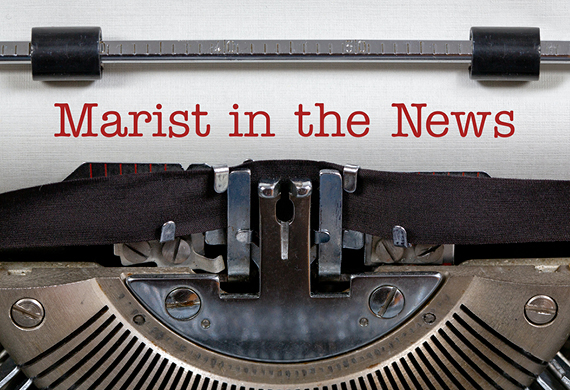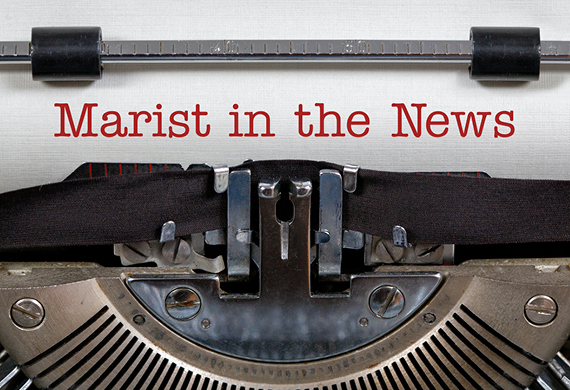Honors Thesis Exhibit Adds a Special Focus on Diversity
December 17, 2018—With thesis topics ranging from climate change to gun control to job satisfaction, 47 seniors from Marist’s Honors Program shared a fascinating array of research projects at the annual Senior Thesis Exhibit on December 3 in the Student Center. Hundreds of people from the Marist community had the chance to see the students’ posters on display and ask them about their work. Reflecting the distinctive nature of the Honors Program, students select their projects according to their academic interest, and the subject matter does not have to be related to their majors. Working closely with a faculty mentor of their choosing, the students conduct in-depth explorations of any research question they wish to pursue.
As a new feature of this year’s exhibit, 12 of the senior theses focused on diversity-related themes. Says Associate Professor of Philosophy James Snyder, who directs the Honors Program, “The focus on diversity was an initiative we started in a sub-committee I co-chair with Haseeb Arroon for the Diversity Council, but I think it just brought together what has been happening for a long time in Honors. About 25 percent of this year’s senior projects focused on diversity, which is even more than I expected.” Snyder notes that he has made diversity and inclusion a cornerstone of the Honors Program. With a large number of seminars related to diversity, students have felt empowered to pursue these ideas in research with faculty mentors. In addition, the interdisciplinary focus of the Honors Program allows for interesting and sometimes unexpected work.
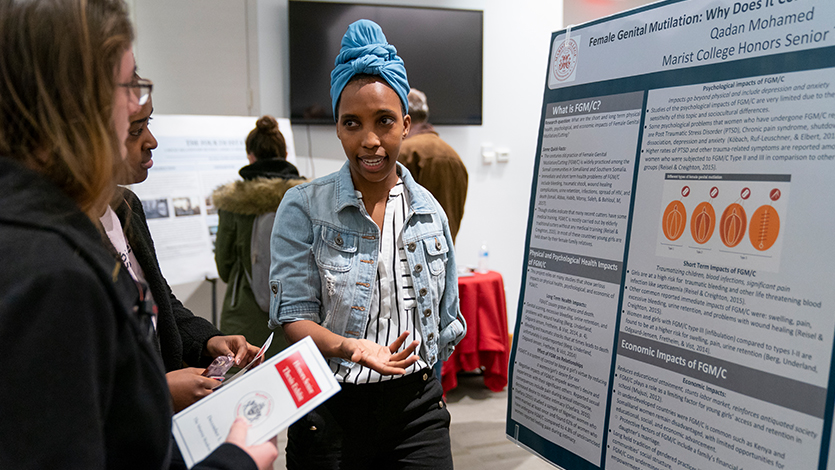
Qadan Mohamed '19
Qadan Mohamed ’19, a psychology major with minors in business and cognitive science, pursued a research topic closely associated with her homeland of Somaliland: “Female Genital Mutilation: Why Does It Continue to be a Cultural Force?” Her work was mentored by Assistant Professor of Political Science Elizabeth Kaknes. Lack of education, she believes, is a big factor in the persistence of female genital mutilation, or FGM. “People aren’t making the connection between this practice and the severe health effects it can cause, including infection and post-traumatic stress disorder, as well as the negative economic impacts. There’s a belief that this tradition is part of who we are,” says Mohamed.
For Mohamed, this issue is not just an academic concern – it is also personal. She notes that a female relative recently underwent the procedure, but the topic is still taboo in most families. “I don’t believe that any mother is intentionally harming her daughter, but educated people must raise awareness of the damage this practice is doing.” To this end, after graduation, Mohamed plans to return to Somaliland to start a school so that other Somalis may benefit from a good education. And she believes that their education should include frank conversations about FGM. Kaknes has high praise for Mohamed and her dedication to this subject: “Qadan is endlessly optimistic and trusts in her singular ability to change the world. It has been a highlight of my time at Marist to work with her as she identifies how she is going to make her mark.” According to Snyder, Mohamed’s research will also be connected with a conference he is hoping to host in the spring, expanding the potential audience. In his estimation, “her work is incredible.”
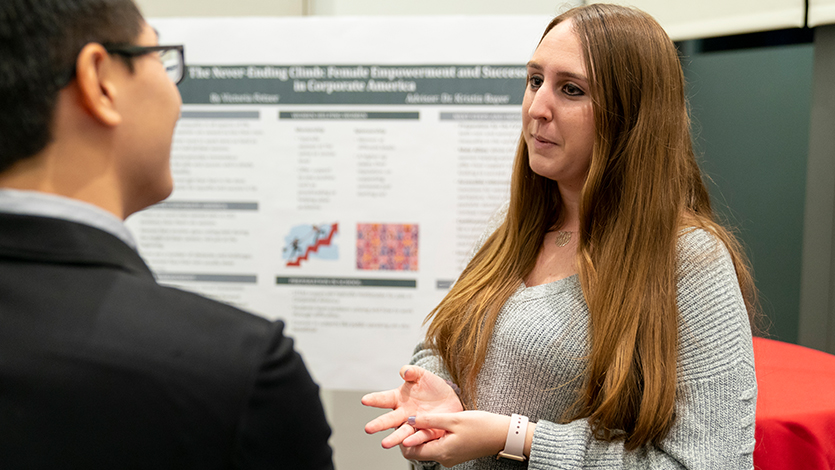
Victoria Fetzer '19
Victoria Fetzer ’19 of Dix Hills, New York came to Marist as a communications major, but switched to a major in mathematics with minors in women’s studies and music. She has always been driven by questions about gender and sexuality, and the Honors Program provided her with an important interdisciplinary space to explore questions that matter to her. Fetzer’s thesis, advised by Assistant Professor of History Kristin Bayer, is entitled “The Never-Ending Climb: Female Empowerment and Success in Corporate America,” and it identifies some of the challenges women face in the workplace: the glass ceiling for promotions, sexual harassment, and less professional recognition.
Says Fetzer, “In business and math classes, I don’t think we talk enough about the issue of inequality. It’s important to do so because we need men to be aware of the problem and to serve as allies in these fields.” Apart from male allies, Fetzer also identifies the need for mentoring and sponsorship of female employees, even by those at the same professional level. “Women must collaborate, not compete,” she says. As part of her project, she even created a “survival guide” to help women prepare themselves for jobs in the corporate world. According to Bayer, “Victoria developed her idea from courses in her major and experiences working in the field. While she was informed by the Introduction to Women’s Studies class she took last year, much of what guided Victoria’s approach was to reflect upon ways of supporting women in corporate work.” Fetzer will carry these ideas forward with her after graduation, when she begins a two-year program at global banking giant UBS.
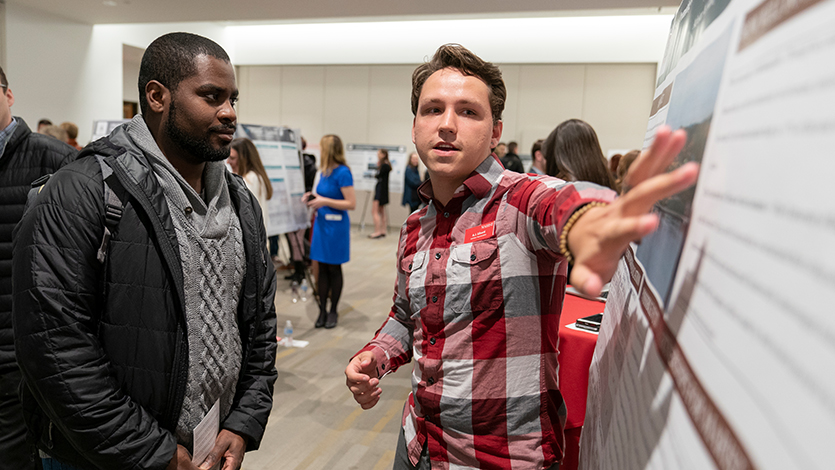
Anthony Liberti '19
Psychology major Anthony Liberti ’19 of Garden City, New York was the first student in Honors to collaborate with the Office of Admissions for his project, “Promoting Diversity in Higher Education Through Partnerships.” As the senior Admission Fellow, Liberti had the unique opportunity to spend the fall semester performing the duties of a full-time admission counselor, including meeting students at high schools and college fairs, presenting information sessions, and reviewing applications. His thesis advisor was Senior Associate Director of Admission Kate Budzinski, who has been a part of institutional efforts to increase the number of students of color enrolled at Marist.
Liberti’s project identifies additional partnership opportunities between the College and outside organizations in order to enroll talented students from underrepresented groups. Says Liberti, “At Marist, I’ve always been struck by the strong sense of community here, and I know we can do better in terms of diversity. I was able to find several organizations in New York City that are successfully working with academically capable but at-risk students. These students would do well at Marist.” His findings will be put to good use. Budzinski notes that “A.J.’s thesis provides the Office of Admissions with dedicated academic research surrounding one of the pressures faced by enrollment offices across the country. His research gives us an additional resource as we continue to enhance our strategic partnerships.” In the future, Liberti plans to attend graduate school and work in higher education administration. Adds Snyder, “Anthony’s thesis project is going to be great for his career because he is tackling an important issue that impacts the intellectual life of colleges.”
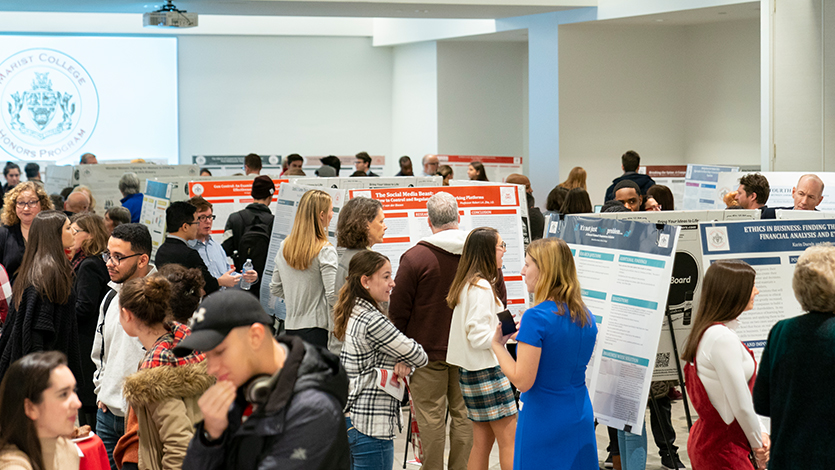
The broad range of other topics at the December 3 exhibition touched on how luxury fashion brands are appealing to Chinese consumers; the effect of laser therapy on superficial wound healing; the ROTC program at Marist; ethics in business; acoustic monitoring of marine mammals; and many others. Another Honors Senior Thesis Exhibit will be held in the spring semester.
According to Snyder, “This is the strongest group of students we have had produce research in our program.” He attributes this in part to the fact that he and Assistant Professor of Psychology Mary Stone (the Honors Assistant Director) instituted a peer-mentor research program, creating triads of students to support one another in the research process. This May, Marist’s Honors Program will graduate 120 students, an extremely impressive number considering that there were only about 25 Honors graduates in 2013. Says Snyder, “These students have all dedicated themselves to a liberal arts curriculum that is broader, deeper, and more complex. They want to explore both enduring questions about the world and humanity, as well as pressing social problems.” Ultimately, the students’ thesis projects will be housed in the James A. Cannavino Library repository.
About the Honors Program
Students craving meaningful academic experiences that connect them with faculty mentors about ideas that matter to them are finding that in Marist’s Honors Program. It is often described as a more focused version of the College’s liberal arts Core curriculum, and the three-credit senior research project is the program’s culmination. The Honors Program seeks to develop scholars, leaders, and global citizens by providing students with opportunities for academic excellence, leadership, cultural enrichment, and global engagement. More than 500 Marist students from all majors and disciplines participate, a number that has increased dramatically in recent years. They build a strong sense of community by living side-by-side in the residence halls.
In addition to the senior thesis, the hallmarks of Marist’s Honors Program include Honors seminars across the curriculum, small classes, special lectures and field trips, intensive advising, and collaboration with a faculty mentor. Honors courses – which count for Core requirements – tend to be both topical and unique. Some of this year’s classes have focused on the Broadway musical Hamilton, Syrian refugees, environmentally sustainable investments, and meditative practices. Professor Snyder calls directing the Honors Program and working with the students a “dream job.” He describes the typical Honors student as “both well-rounded and focused. They take liberal arts seminars that ask them to engage with the biggest intellectual and practical problems we are facing today.” Honors seminars change every semester, giving the program flexibility to examine issues of contemporary relevance. Among the seminars planned for the spring 2019 semester are Leadership (taught by President Emeritus Dennis Murray), The Ethics of Food, Women and Art, Social Media and Society, and Religion and Politics.

